Lord Keeper of the Privy Seal of Japan
The Lord Keeper of the Privy Seal of Japan (内大臣, Naidaijin) was an administrative post not of Cabinet rank in the government of the Empire of Japan, responsible for keeping the Privy Seal of Japan and State Seal of Japan. The modern office of the Lord Keeper of the Privy Seal was identical with the old Naidaijin only in name and should not be confused.[1] The office was abolished in 1945 after the Second World War.
History
Meiji period
The modern office of the Lord Keeper of the Privy Seal was formed in 1885, after the Meiji government established the Japanese cabinet; however, the Lord Keeper of the Privy Seal was separate from the cabinet, and acted as a direct, personal advisor to the Emperor. He was also responsible for the administration of imperial documents such as rescripts and edicts. Petitions to the emperor and the court were also handled by the Lord Keeper's office, as well as the responses.
.png.webp)
When the Privy Council was created in 1888, the Privy Seal retained his independent advisory role. The term "privy" in Privy Council and Privy Seal identifies a direct relationship of special trust.
In 1907, the post was expanded to become the Office of the Lord Keeper of the Privy Seal (内大臣府, Naidaijin-fu) with a chief secretary, three secretaries and six assistants in order to handle the increased workload with the passing of the genrō.
Shōwa period
After the start of Emperor Hirohito's reign in 1925, the office and position of the Lord Keeper of the Privy Seal became increasingly important, at the expense of the office of the Prime Minister. Political infighting within the Diet of Japan further boosted the power of the Lord Keeper. The holder of this position was able to strictly control who was allowed to have an audience with the emperor, as well as the flow of information.
The office of the Lord Keeper of the Privy Seal was officially abolished on 24 November 1945,[2] and the position itself was abolished with the promulgation of the new constitution in November 1946. Thus, former Grand Chamberlain Fujita Hisanori was the last Lord Keeper.[3]
Today, the seals are kept in the care of the Chamberlain of Japan.
List of Lord Keepers of the Privy Seal
| Portrait | Name | Term of office | |
|---|---|---|---|
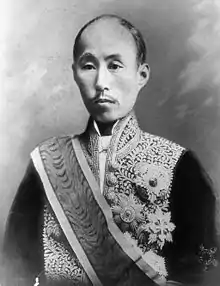 |
Sanjō Sanetomi 三条実美 |
22 December 1885 |
18 February 1891 |
.jpg.webp) |
Tokudaiji Sanetsune 徳大寺実則 |
21 February 1891 |
12 August 1912 |
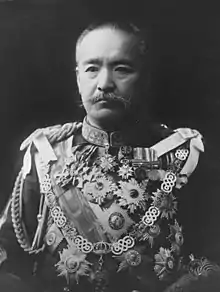 |
Katsura Tarō 桂 太郎 |
21 August 1912 |
21 December 1912 |
.jpg.webp) |
Prince Fushimi Sadanaru 伏見宮貞愛親王 |
21 December 1912 |
13 January 1915 |
.jpg.webp) |
Ōyama Iwao 大山巌 |
23 April 1915 |
10 December 1916 |
.jpg.webp) |
Matsukata Masayoshi 松方正義 |
2 May 1917 |
18 September 1922 |
.jpg.webp) |
Hirata Tōsuke 平田東助 |
19 September 1922 |
30 May 1925 |
.jpg.webp) |
Hamao Arata 濱尾新 |
30 March 1925 |
30 March 1925 |
 |
Makino Nobuaki 牧野伸顕 |
30 March 1925 |
26 February 1935 |
.jpg.webp) |
Saitō Makoto 斎藤実 |
26 February 1935 |
6 February 1936 |
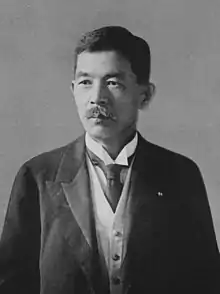 |
Ichiki Kitokurō 一木喜徳郎 |
6 March 1936 |
6 March 1936 |
 |
Yuasa Kurahei 湯浅倉平 |
6 March 1936 |
1 June 1940 |
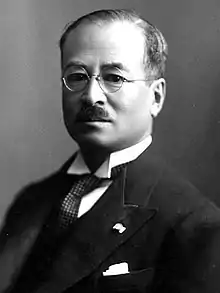 |
Kido Kōichi 木戸幸一 |
1 June 1940 |
24 November 1945 |
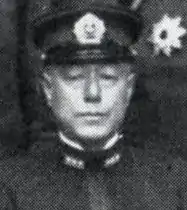 |
Fujita Hisanori 藤田 尚徳 |
25 November 1945 |
2 November 1946 |
See also
Notes
- http://www.unterstein.net/or/docs/JapanPeers.pdf
- http://www.ndl.go.jp/constitution/e/etc/glossary.html National Diet Library | Office of the Lord Keeper of the Privy Seal
- John Dower, Embracing defeat, 1999, p.320
References
- Takenobu, Yoshitaro. (1928). The Japan Yearbook; Complete Cyclopaedia of General Information and Statistics on Japan and Japanese Territories. Tokyo: The Japan Year Book Office. OCLC 145151778